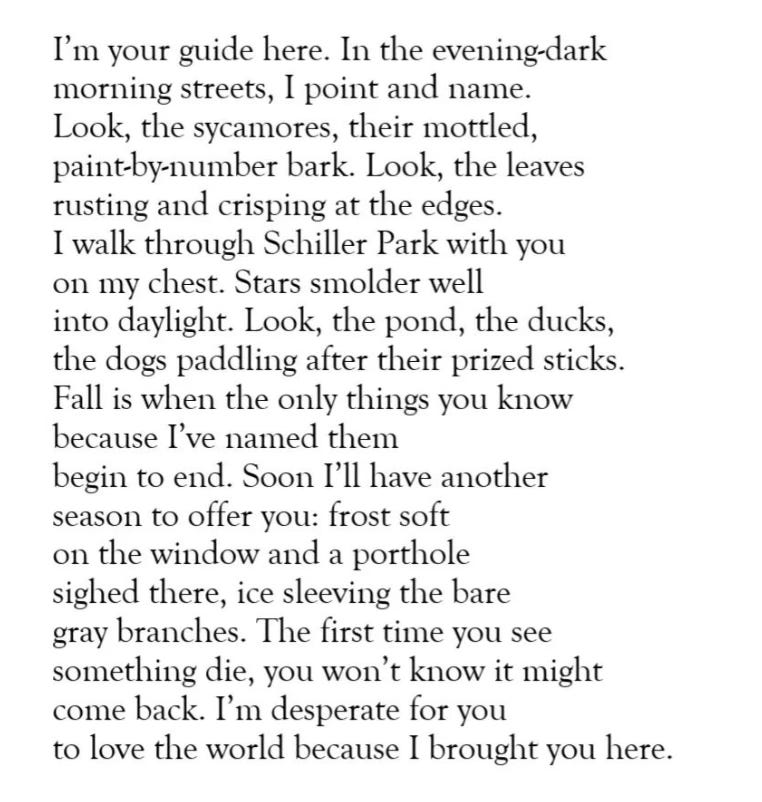Hi, Friend.
It’s full-on fall here, and I love how everything is changing. The trees are all lit up now—red, pink, orange, yellow, burgundy—but they’ll dim soon enough, and we’ll have a better view of the sky through the bare branches until spring. I’ve lived in the same house for fifteen years, and I’m still awestruck by what I see from my windows and in my neighborhood each day. It never gets old—which is to say, it’s somehow always new.
I want to talk a little about novelty. Sometimes I hear from young writers that they can’t think of anything to write about because nothing exciting has happened to them, or they haven’t traveled much. They think they need more—or different—experiences in order to have something to say, as if their own lives aren’t enough material. But they’re plenty. Your life, whatever it looks like, is plenty. You don’t need to be someplace new to see—or hear, or taste, or smell, or feel—something new.
The other day I walked outside, and the sky was unlike anything I’ve ever seen before. (See cloud photo as evidence. I mean: wow.) Each day is a one-off. Each day’s sky, too. Thoreau, who walked almost every day for years in the same vicinity, wrote, “two or three hours’ walking will carry me to as strange a country as I expect ever to see.”
I’m a Midwesterner through and through; I’ve lived here all my life, but it’s always different. Part of what I need to do to keep this place fresh—for me first, and also for the reader—is to never let it be the same place. That means trying to notice things that I didn't notice the day before. For example, my poem “First Fall” from Good Bones was inspired by walks in my neighborhood with my newborn daughter. (She turns sixteen in December. Please someone explain to me how that’s even possible.)
In this poem, the speaker introduces the child to the world by acting as tour guide, and by extension becomes a tour guide for the reader. “Look” is repeated as a command three times. That’s our job as writers: paying attention. As you move through places familiar and unfamiliar, try to see with fresh eyes.
If you’re up for a writing prompt, here’s one: Draft a poem or an essay about a place you know well, using sensory detail and figurative language to make it new for yourself, and in turn, for the reader. Maybe it’s your hometown, or your mother’s kitchen, or beach you visit every summer, or your workplace. With the season changing, this is a great time to notice different aspects of a familiar landscape: new colors, textures, even sounds.
Or, begin a piece about a new place. Maybe you’ve traveled recently or are in an unfamiliar place as we speak. What do you notice about it? What has surprised you? What, as a tour guide, would you like to share with us?
Either way, challenge yourself to use as much sensory detail to bring the place to life for us. What does the speaker or narrator see, hear, smell, touch, and taste? You might even begin your free write with “I’m your guide here.” Sometimes borrowing another piece’s framework, or even an opening line or sentence, can help get you started.
Here are a few other poems you might enjoy and get some inspiration from: “If I Should Come Upon Your House Lonely in the West Texas Desert” by Natalie Diaz, “In Defense of Small Towns” by Oliver de la Paz, and “The Beatitudes of Malibu” by Rowan Ricardo Phillips.
Happy writing (& noticing)—
Maggie






So happy to see this in my box this morning! Thanks for the prompt! I took a stab!
Did you see
The moon the last night?
A glowing sliver.
When you were all little
We would go outside barefoot
You can smell the fresh grass
Little fingers pointing up
In celestial awe
You are all grown now
In your own spaces
Busy with this and that
Don’t forget:
It’s in the noticing
You will find your breath
Your way home
I needed that "beauty emergency" of a sky today. How amazing.
Thanks for this post and for continuing to help us think about craft.
Beautiful poem for your almost 16 year old.